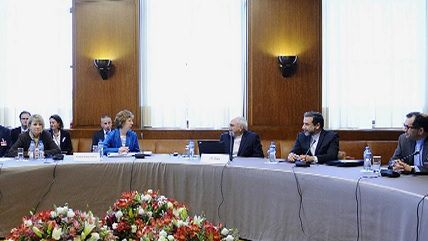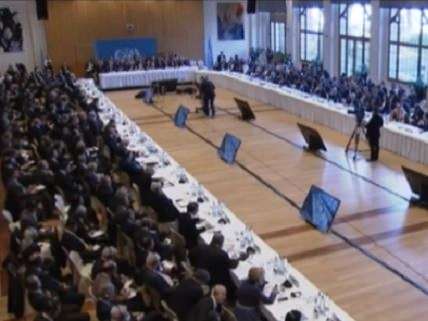Republican Letter to Iran Dismissed as 'Propaganda Ploy,' Negotiations Not Bilateral
Iran's foreign minister dismissed the Republican letter explaining the Constitution as a "propaganda ploy" and pointed out a deal wouldn't be bilateral.


Forty seven of 54 Senate Republicans signed an open letter (pdf) addressed to the "leaders of the Islamic Republic of Iran," who "may not fully understand our constitutional system," purporting to explain how the Constitution works and warning that an "executive agreement" between President Obama and the supreme leader of Iran might not be honored by a future U.S. president. From the letter:
First, under our Constitution, while the president negotiates international agreements, Congress plays the significant role of ratifying them. In the case of a treaty, the Senate must ratify it by a two-thirds vote. A so-called congressional-executive agreement requires a majority vote in both the House and the Senate (which, because of procedural rules, effectively means a three-fifths vote in the Senate). Anything not approved by Congress is a mere executive agreement.
The Republicans go on to explain term lengths and limits, noting President Obama leaves office in 2017 but some of them may remain in office for "decades." None of the seven Republican senators who didn't sign the letter—Lisa Murkowski (Alaska), Jeff Flake (Ariz.), Dan Coats (Ind.), Susan Collins (Maine), That Cochran (Miss.), and Lamar Alexander (Tenn.)—are considered likely presidential candidates.
Vice President Joe Biden thought the letter was "beneath the dignity" of the institution he reveres, and spent decades in himself. Iran's foreign minister, Javad Zarif, dismissed the letter as a transparent "propaganda play," which he said suggested:
some political pressure groups are so afraid even of the prospect of an agreement that they resort to unconventional methods, unprecedented in diplomatic history. This indicates that like Netanyahu, who considers peace as an existential threat, some are opposed to any agreement, regardless of its content."
Iran's foreign minister also pointed out in comments in a press release from Iran's U.N. mission that any agreement on the country's nuclear program would not be a bilateral deal between the U.S. and Iran but include other countries involved in the negotiations as well. Zarif:
"I should bring one important point to the attention of the authors and that is, the world is not the United States, and the conduct of inter-state relations is governed by international law, and not by US domestic law. The authors may not fully understand that in international law, governments represent the entirety of their respective states, are responsible for the conduct of foreign affairs, are required to fulfil the obligations they undertake with other states and may not invoke their internal law as justification for failure to perform their international obligations."
The negotiations with Iran, in fact, are happening in part within the context of the Nuclear Non-Proliferation Treaty, a treaty Iran acceded to in 1970, before the coup that brought the Islamic Republic to power. Iran has been found in non-compliance of the treaty before but, unlike North Korea, has not withdrawn from the treaty. Other countries that acquired nuclear capabilities after the 1940s—Israel, India, and Pakistan—are not members of the treaty.


Show Comments (44)